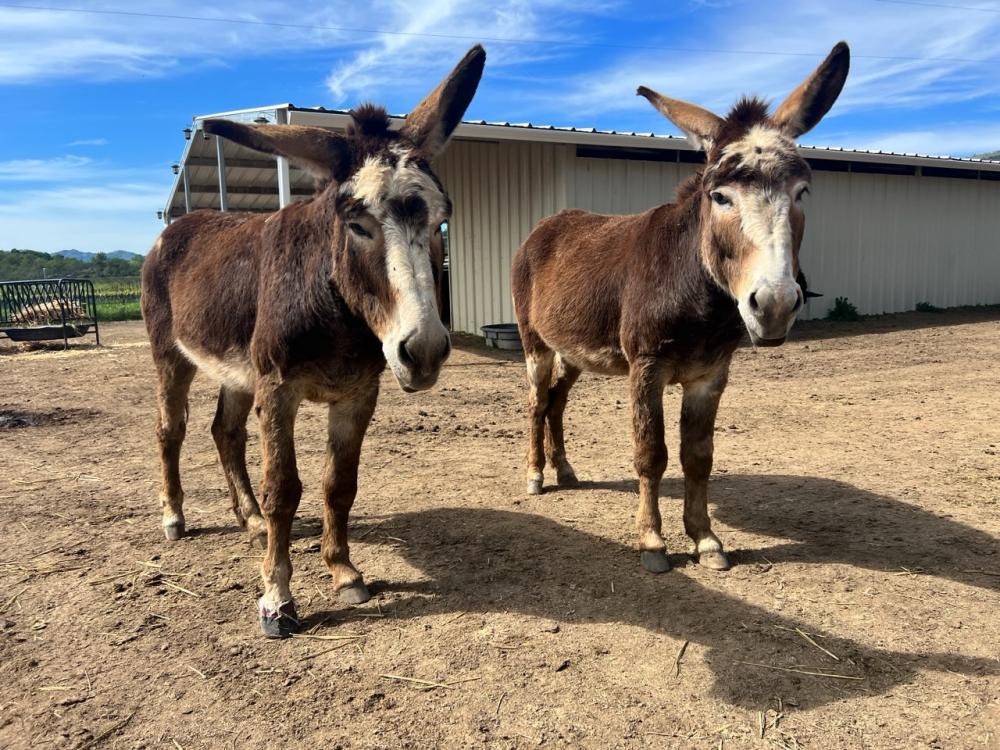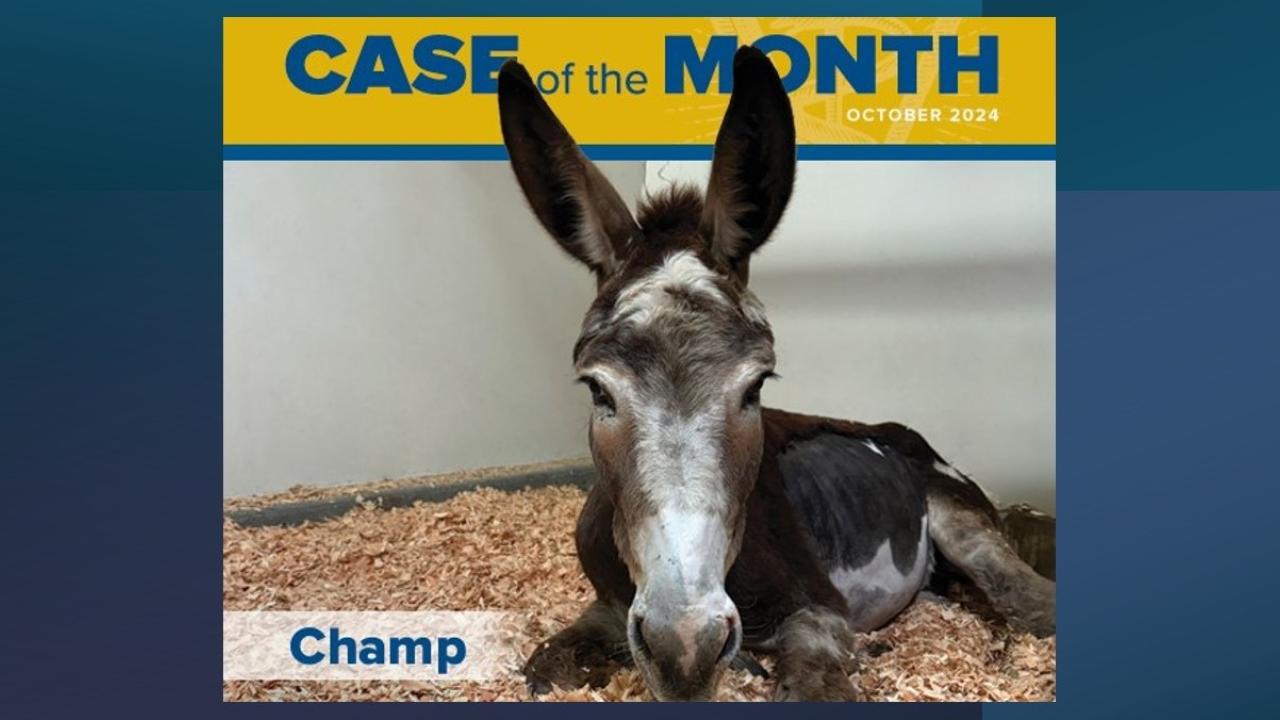
Rescued Donkey Overcomes Muscular Disorder Brought on by Trace Mineral Deficiency
“Case of the Month” – October 2024
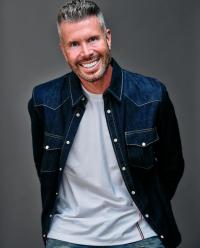
Many people’s careers and lives were drastically changed due to the pandemic. But very few went from Gucci and a first-class lifestyle in fashion media to work boots and 4 a.m. wake-up calls on a ranch. Enter Ron King, a former executive vice president leading InStyle magazine who traded front row seats at Versace fashion shows in Milan for dusty corrals full of donkeys being saved from slaughter, abuse, and other inhospitable environments.
When he lost his job in a corporate restructuring, and the pandemic dried up any further opportunities, King agreed to temporarily move to Northern California to help his friend sell a ranch. But while walking the grounds one day, he felt a sense of calm that eluded him for decades.
“It was the first time I felt serenity in 20 years,” King told “CBS Mornings” in 2022.
He randomly saw a video about saving donkeys, and a light went off in his head.
“I wanted to live a life with meaning,” said King.
Although King had no background in caring for animals, his friend believed in him and donated the property to a foundation that would become Oscar’s Place Adoption Center & Sanctuary.

Fast forward a few years, and Oscar’s Place has saved more than 300 donkeys since its founding. Currently, there are 185 donkeys at the sanctuary, many of which need medical care.
In the past three years, King has brought nearly 50 donkeys to the UC Davis veterinary hospital’s Large Animal Clinic.
Champ, a 5-year-old gelding, is one of the latest.
Things were smooth with transporting Champ to UC Davis, but that wasn’t always the case. King recalls when he needed to transport the first two donkeys he rescued to the hospital. He didn’t own a trailer, had never driven a trailer, and had never loaded an animal into a trailer. But where there’s a will, there’s a way. He bought a trailer, begged the sellers to give him a crash course in driving it, and managed to get the donkeys the help they needed. At the end of that harrowingly long day, he was admittedly “brain dead” and forgot about the trailer as he got it stuck in a fast food drive thru.
“That was my first experience with getting animals to UC Davis,” King said. “But we had an amazing doctor. Those two animals turned around, and we’ve had a great experience with UC Davis ever since.”
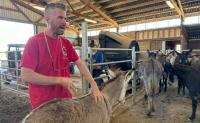
King first noticed something wrong with Champ when his facial features seemed unusual. Then he didn’t eat that day.
“Champ is a very friendly donkey,” King said. “I know him really well, so I knew just from looking at him that something was off.”
Their primary veterinarian gave him supportive care, but didn’t initially know exactly what was wrong, so she recommended taking Champ to UC Davis.
He presented to the Equine Internal Medicine Service with hypersalivation, weakness, and decreased gut sounds. He was unable to grasp, chew, or swallow any type of food.
After multiple tests including bloodwork, ultrasound, and a muscle biopsy, it was revealed that Champ had masseter myodegeneration, a condition caused by vitamin E and selenium deficiencies (both nutrients can be scarce in the dry forage of Northern California). It brings on what is known as white muscle disease, a weakening of the muscles in the face, mouth, lips, jaws, and even the eyes.
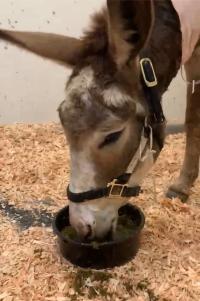
Champ was hospitalized in the Equine Intensive Care Unit for medical management and supportive therapy. A nasogastric tube was placed in him to administer medications and nutritional support. His care team also performed physiotherapy to help Champ recover muscle function of the masseter, the main masticatory muscle used for chewing.
“Once the muscle inflammation was controlled, the next challenge was gaining strength in the masseter," said Dr. Camilo J. Morales, who took the lead on Champ’s case along with several faculty and intern veterinarian Dr. Claudia Valderrama-Martinez on the Equine Internal Medicine Service. "Slowly, Champ regained the ability to eat, and we were able to slowly withdraw the intravenous and enteral nutritional support. It was challenging getting Champ back to health, but he ultimately responded well to the intensive medical treatment and supportive care.”
After 10 days of hospitalization, Champ was discharged. Following more masticatory physiotherapy at Oscar’s Place, Champ was adopted along with two other donkeys with whom he bonded.
“We still do not know a lot about masseter myositis in equines, however, with Champ’s resilience and the owner’s support, we were able to have a good outcome,” said Dr. Morales.
In Champ’s case, the masseter myositis was caused by low selenium, which highlights the importance to horse, mule, and donkey owners to ensure their animals are receiving appropriate selenium supplementation. Owners should work with their veterinarians or nutritionists to ensure their animals are getting enough selenium in their diets.
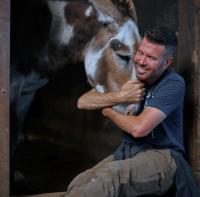
The sanctuary’s goal is to rehome as many donkeys as possible, freeing up space to care for more. King states that they will not adopt out any donkeys until they are healthy, farrier trained, trailer trained, and safe to be around any potential new owners. He also noted their policy of not splitting up bonded pairs and families. With those criteria, only about 10% of the donkeys are ready to be adopted at any given time. There are about 25 donkeys that live at Oscar’s Place permanently due to medical issues or old age.
At Oscar’s Place, King has found the peace he never realized he was looking for, and hundreds of animals are being saved.
“Sometimes we think we know what our next chapter should look like,” King said. “But what we really need to do is get out of the way (and let it come to us).”
# # #
